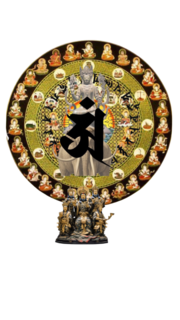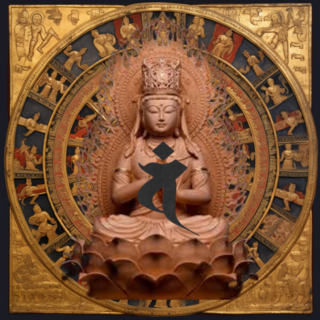すべてのものは因縁所生
しかし仏教では、すべては縁起であり、因縁所生のものであるから、永遠不滅の実在などなく、 あらゆる存在が業により生じ、 業によって滅していくと考えるわけです。仏教も輪廻転生を根本 教義の一つとしておりますが、アートマンが輪廻転生するとは考えません。アートマンは実在し ない。これを中国では「無我(旧訳では非我)」と訳しました。アートマンを「我」と漢訳し、そ 「我」がないということで「無我」としたわけです。 すべてが因縁により生じ、因縁によって 滅するのであるから、人は運命を変えることができるのです。それが仏教の基本的な立場であり、 バラモン教やヒンドゥー教と違う点です。
もしもアートマンが実在し、それが輪廻転生するのであるならば、人は運命を変えることも、 輪廻から解脱することもできません。 なぜならばアートマンは常住不滅・常恒不変なのですから、 消滅させることも変化させることも不可能だからです。アートマンなどは実在せず、すべてのも のが因縁によって生じ、また滅していくからこそ、人は生死輪廻から解脱することができるわ けです。お釈迦さまはそのように縁起の真理を説かれました。
さらにバラモン教やヒンドゥー教では輪廻転生を説くものの、そこからの脱出方法は、あまり 明確には示しておりませんでした。そのために古代インドの人々は、非常に苦しんだのです。輪 廻の中で生き続け、そこから脱出することがままならないわけですから、彼らは来世を案じて苦 しみました。
「来世はよい境界に生まれたい」
あるいは、
と考えました。
いかないまでも、悪に堕ちたり動物や虫に生まれて悲惨な一生を送りたくなバラモン教やヒンドゥー教も葉報思想を持っておりますから、現世で悪業を積んだならば、 来 世は悲惨なものに生まれて苦しむぞと説きます。 犬に生まれてくるかもしれないし、豚に生まれ ソーセージにされてしまうかもしれない。 またはゴキブリに生まれて、叩き殺されるかもしれ ません。 来世はなにに生まれるか分からないのですから、一分一秒たりとも気が抜けないのです。 これは古代インドの人たちにとって、すさまじいプレッシャーになりました。現代のヒンドゥー 教徒も同じです。 彼らは常に来世を考えて行動しています。 現在よりも来世のことを考えて、 戦々恐々としているのです。そして、来世で苦しみの生を享けないように、神々を拝み、供物を 捧げています。 古代インドでも現代のインドでも同じです。 これでは生きた心地がしないだろう、 とわたくしは思います。
ところがお釈迦さまが、 アートマン思想が蔓延している古代インドに出現されて、「すべては因縁所生であって、アートマンなどという常住不滅・常恒不変の実在などはない」と縁起の法を説かれ、さらには輪廻から完全に解脱する方法・成仏法を説かれたものですから、 当時の人々は、みな、びっくりしたわけです。
けれども、お釈迦さまのおっしゃることをよく聞いてみると、なるほどと納得できます。 お釈 一旦九
迦さまの教法によって、当時のインドの人々の心からプレッシャーがなくなりました。 これが、 お釈迦さまの教法がもたらした、第一の救いでした。日本人の、それも現代人のわたくしたちに はなかなか理解できませんが、彼らには最高の福音だったのです。
すべてが縁によって起こる。 縁によって生じ、緑によって滅するのであって、 常住不滅・常恒 不変のものはなにもない。これは、すばらしい真理です。 昔、日本のある名僧が、縁起の法を歌 に詠まれました。
引き寄せて結べば朱の庵かな解くれば元の野原なりけり」
じつに分かりやすい名歌ですね。野原に小屋のような庵が一軒あります。それはいろいろな木 材や茅・柴を縛ったり組んだりして造られているけれども、それらをばらばらにしてしまった ら、もとのなにもない野原に戻ってしまう。板きれ、 茅、 柴が転がっているだけの、ただの野原 です。それらの材料を集めて、家の形にしたならば庵になるけれども、ばらばらにしてしまった ら、もう庵ではありません。材料が緑によって集まり、仮合して庵になっているだけですから、 それは常恒不変ではありません。 存在はしているけれども、実在ではありません。 これを仏教で は「空」と呼びます。
人もの庵も同じです。わたくしも緑によって桐山靖雄という人間になっているだけで、桐山 靖雄としての縁がなくなったならば、違う存在になってしまいます。まさに空です。 縁起という ことは、すべてのものが条件によって変化し続けることでもありますから、古い訳では縁起の法を変易の法としております。 変易とは変化するという意味です。
お釈迦さまは、「一切は空であって一切告空)、アートマンはない(諸法無我」と説かれました。緑によって生じ、緑によって滅するのだから、 常住不滅・常恒不変の自我が実在すると考え るのは間違いなのです。
ところがそれでも、アートマンが実在すると信じている人がたくさんおります。 縁起の法が分 からない、あるいは理解しようとしないという煩悩が身見なのです。 前述のようにアートマンは 「我」と漢訳されますので、身見は別名を我見といいます。
身見のもう一つの意味は、常住不滅・常恒不変の実在がないということが理解できないために 生じる自己中心的な考え方です。 凡夫は永遠不滅の自我があると考えるために、自分に執着し、 「自分のもの」に執着します。 これを仏教では我執といいます。この世に「自分のもの」などあ りはしません。 今、自分が所有していたとしても、それは自分のところに来る緑がたまたま存在 したから、仮に自分のところにあるだけで、永遠に自分の手もとにあるわけではありません。 緑 がなくなればだれかの手に渡ったり、壊れてなくなったりします。 しかし、縁起の道理が分から ないから、
「自分のものなのに!」
と執着するのです。これも身見です。
仏道修行者は、永遠不滅の自我が実在しているという妄執と、なんでも自分中心に考える我執 を断ち切らなければならないのです。
この場合の疑惑とは、ただ物事を疑って信じないということではありません。 仏さまの正しい
教えを疑い惑って、なかなか信じないという意味での疑惑です。お釈迦さまの正法に疑いを持つ 煩悩、これが疑惑です。
戒取とは、お釈迦さまの正しい教え以外の宗教、あるいは倫理・道徳・哲学などを信じて、お 釈迦さまの真実の教法を信じようとしない煩悩です。
-三結断じた第一の聖者
以上の身見・疑惑・戒取の三つを完全に切った人が須陀酒です。 須陀酒は別名を預流といいま す。流れに預かる (入る) と書くわけですが、どのような流れに入るのでしょうか?これは聖者の流れに入るという意味です。須陀酒になった人は聖者で、須陀酒になっていない 人は凡夫です。それで須陀酒を聖俗の分かれ目とします。 須陀酒になると二度と聖者の流れから 堕ちることはなく、必ず成仏に向かいますので、これを「不退転の法を成する」というのです。 もちろん同じ須陀洹でも、須陀洹になってからの修行の具合によって、成仏までの時間は異な ります。一生懸命に修行をするならば早く成仏しますし、怠けていたならば時間がかかります。 けれどもいずれにしても、必ず最後には成仏します。
「阿含経」には、須陀は人間界と天上界を七度往来して成仏する、と記されております。 須陀 がこの世を去ると、天上界に生じて天になります。 仏教の天とは、「運を天に任せる」の「天」 のようなとらえどころのないものではなく、サンスクリット語の「デーヴァ」を訳したもので、 神の境界のことです。 仏界と人間界との間に、天上界という神々の世界があるわけです。天は仏 のように完全な解説は得ていません。 しかし、人間よりは解脱に近づいている存在です。
一般に、天は一神通を持つとされます。 ○○天という名前でお祀りされているのはみな天上界 の神々で、成仏はしていないものの一つの神通を身に備えておられます。たとえば大黒天、弁才 天韋駄天などがそうです。韋駄天は韋駄天走りという言葉があるように、駿足の神さまです。 あっという間に二、三百キロメートルくらい走ってしまいます。ですからマラソン選手などは、 韋駄天を信仰するとよいかもしれません。弁才天というのは芸能の神です。 芸能面に関する、す ばらしい神通力を持っておられます。
須陀は寿命が尽きると天になり、 一神通を使って人を救います。そのように、天上界におい でも修行するのです。 天での寿命が尽きると、須陀道は人間界に戻ってきて、ここでも世のため になるようなことをします。それで人間界での寿命が尽きたならば、再び天界に行くわけです。 合計で七回往来するとされています。
須となって天上界へ行った人がこの世に帰ってきた場合 天上界では天として一神通を 持っていたわけですから普通の人が持たないような、すばらしい力を必ず発揮します。ひょ とすると大天才といわれる人物は、天から戻ってきた人なのかもしれません。 モーツァルト (一七五六一七九一)などは、三歳のころから神童といわれ、五歳で作曲を手がけたそうです。
All things are born of fate
However, in Buddhism, everything is dependent on origin and is born through fate, so there is no such thing as an eternal and immortal existence, and all existence is born through karma and is destroyed through karma. Buddhism also considers reincarnation as one of its fundamental tenets, but it does not believe that the Atman reincarnates. Atman is real and he is not. In China, this was translated as "non-self" (in the old translation, non-self). Atman was translated into Chinese as ``I,'' and since there is no ``I,'' it was translated into ``non-self.'' Because everything comes into being and ends by fate, people can change their destiny. This is the basic position of Buddhism, and it is different from Brahmanism and Hinduism.
If Atman exists and reincarnates, then one cannot change one's destiny or escape from reincarnation. This is because the Atman is eternal, eternal, and unchanging, and cannot be annihilated or changed. There is no such thing as the Atman, and all things arise and perish due to fate, and it is precisely because he is the one who can liberate himself from the cycle of birth and death. The Buddha preached the truth of dependent origin in this way.
Furthermore, although Brahmanism and Hinduism preach reincarnation, they do not clearly indicate how to escape from it. The people of ancient India suffered greatly because of this. Since they continued to live in the cycle of reincarnation and were unable to escape from it, they suffered in fear of their next life.
“I want to be born with good boundaries in my next life.”
or,
I thought.
Brahmanism and Hinduism also have the idea of ``haha'', which does not want to fall into evil or be born as an animal or insect and lead a miserable life. I preach that if you are born into misery, you will suffer. You may be born a dog, or you may be born a pig and become his sausage. Or he might be born a cockroach and be beaten to death. I don't know what I will be born into in the next life, so I can't relax even for a minute. This put tremendous pressure on the people of ancient India. The same is true of modern Hindus. They always act with the afterlife in mind. They are thinking more about the next life than the present, and are fearful. In order to avoid suffering in the next life, they worship the gods and make offerings. It is the same in ancient India and modern India. I don't think this will make me feel alive.
However, the Buddha appeared in ancient India, where the idea of Atman was widespread, and preached the law of dependent origin, saying, ``Everything is due to fate, and there is no such thing as Atman, which is an ever-living, immortal, eternal, unchanging entity.'' Furthermore, the people of the time were astonished because he taught the method of attaining Buddhahood, a method for completely liberating oneself from reincarnation.
However, if you listen carefully to what Buddha says, you will understand. Interpretation once nine
Lord Buddha's teachings removed pressure from the minds of the people of India at that time. This was the first salvation brought about by Buddha's teachings. Although it is difficult for Japanese people, especially us modern people, to understand him, he was the best gospel for them.
Everything happens because of connections. It arises through connection and perishes through greenness, and there is nothing that is everlasting, eternal, or unchanging. This is a wonderful truth. A long time ago, a famous Japanese monk wrote a poem about the law of auspicious origin.
If you pull it together and tie it, it will be a vermilion hermitage, or if you untie it, it will be the original field.''
It's a great song that's really easy to understand. There is a hermitage that looks like a hut in the field. It is made of various types of wood, thatch, and brushwood tied together and tied together, but if you tear it apart, it will return to its original, empty field. It's just a field with pieces of planks, thatch, and bushes lying around. If you gather those materials and make them into a house, it becomes a hermitage, but if you break it up into pieces, it is no longer a hermitage. It is not a permanent hermitage because the materials are gathered together by the greenery and temporarily combined to form a hermitage. It exists, but it is not real. In Buddhism, this is called ``emptiness.''
The same goes for Hitomono-an. I am also Yasuo Kiriyama because of Midori, but if I were to no longer have that connection as Yasuo Kiriyama, I would become a different person. It's just empty. Dependent origin also means that everything continues to change depending on conditions, so in older translations, the law of dependent origin is the law of change. Change means to change.
The Buddha taught that ``All is empty and all is empty, and there is no Atman (all dharma is selfless.'') Since green is what arises and green is what annihilates, the ever-living, immortal, ever-changing ego is real. It is a mistake to think that.
However, there are still many people who believe that the Atman is real. The earthly desires of not knowing or not trying to understand the Law of Dependent Origination are what we see. As mentioned above, Atman is translated into Chinese as ``I,'' so ``Mimi'' is also called ``Gami.''
Another meaning of ``miken'' is the self-centered way of thinking that arises because one cannot understand that there is no eternal, eternal, and unchanging reality. Ordinary people think that they have an eternal and immortal ego, so they become attached to themselves and to what is ``their own.'' In Buddhism, this is called self-control. There is no such thing as ``mine'' in this world. Even if you own it now, it is only because the greenery that came to you happened to exist, so it is not in your hands forever. If the greenery runs out, it will end up in someone else's hands or break down and disappear. However, since he doesn't understand the principle of dependent origin,
“Even though it’s mine!”
I am obsessed with it. This is also my personal observation.
Practitioners of Buddhism must break free from the delusion that an eternal and immortal self exists and from the self-centeredness of thinking about everything.
Doubt in this case does not just mean doubting something and not believing it. Buddha's righteousness
Doubt in the sense of doubting the teachings and having a hard time believing them. The earthly desires that doubt the Buddha's righteous teachings are doubts.
Precepts are the earthly desires of people who believe in religions, ethics, morals, philosophy, etc. other than the correct teachings of the Buddha, and refuse to believe in the true teachings of the Buddha.
-The first saint who severed the three ties
A Sudarake is a person who has completely cut off all three of the above-mentioned personal observations, suspicions, and precepts. Another name for Sudakake is Yukinryu. It is written as ``to follow the flow'' (to enter), but what kind of flow do we enter into?This means to enter into the flow of the saints. Those who have become Sudakake are saints, and those who have not become Sudakake are ordinary people. Therefore, Suda sake is considered to be the dividing line between the sacred and the secular. Once you become Suda Sake, you will never fall from the stream of saints again and will definitely head towards Buddhahood, which is called ``fulfilling the unfailing Dharma.'' Of course, even within the same Suda-sun, the time it takes to reach Buddhahood differs depending on the level of training one has undergone since becoming Suda-sun. If you practice hard, you will attain Buddhahood quickly, but if you are lazy, it will take time. But either way, you will definitely attain Buddhahood in the end.
In the Agon Sutra, it is written that Sudha travels between the human world and the heavenly world seven times and attains Buddhahood. When Sudha leaves this world, he arises in the heavenly world and becomes heaven. In Buddhism, heaven is not something as elusive as the word ``heaven'' in ``leaving one's luck to heaven,'' but is a translation of the Sanskrit word ``deva,'' which refers to the boundaries of God. Between the Buddhist world and the human world, there is a world of gods called the heavenly world. Heaven has not received a complete explanation like Buddha. However, they are closer to liberation than humans.
Generally speaking, heaven is said to have one divine connection. The gods enshrined under the name ○○ten are all gods of the heavenly world, and although they have not attained Buddhahood, they possess a divine power within themselves. For example, Daikokuten, Benzai Tenvaidaten, etc. Idaten is the god of swift feet, as the word Idaten runs. He can run about two or three hundred kilometers in no time. Therefore, it may be a good idea for marathon runners to worship Idaten. Benzaiten is the god of entertainment. He has amazing supernatural powers when it comes to entertainment.
When Sudha reaches the end of his life, he becomes heaven and uses his power to save people. In the same way, he practices in the heavenly realm. When his life in heaven is over, Sudhado returns to the human world, and here too he does what he does for the world. When his life in the human world comes to an end, he goes back to heaven. It is said that there will be seven trips in total.
If a person who went to the heavenly world as a man comes back to this world, he will definitely exhibit wonderful powers that ordinary people do not have, since he had the power of one god in the heavenly world. Perhaps the person who is said to be a great genius is someone who has returned from heaven. Mozart (17561791) was said to be a child prodigy from the age of three, and began composing music at the age of five.
http://cyber-price.com/buddha/
Buddha Japan Journal
Buddha Japan journal
日本の仏教を発信しますSend Japanese Buddhis
【このカテゴリーの最新記事】
-
no image
-
no image






